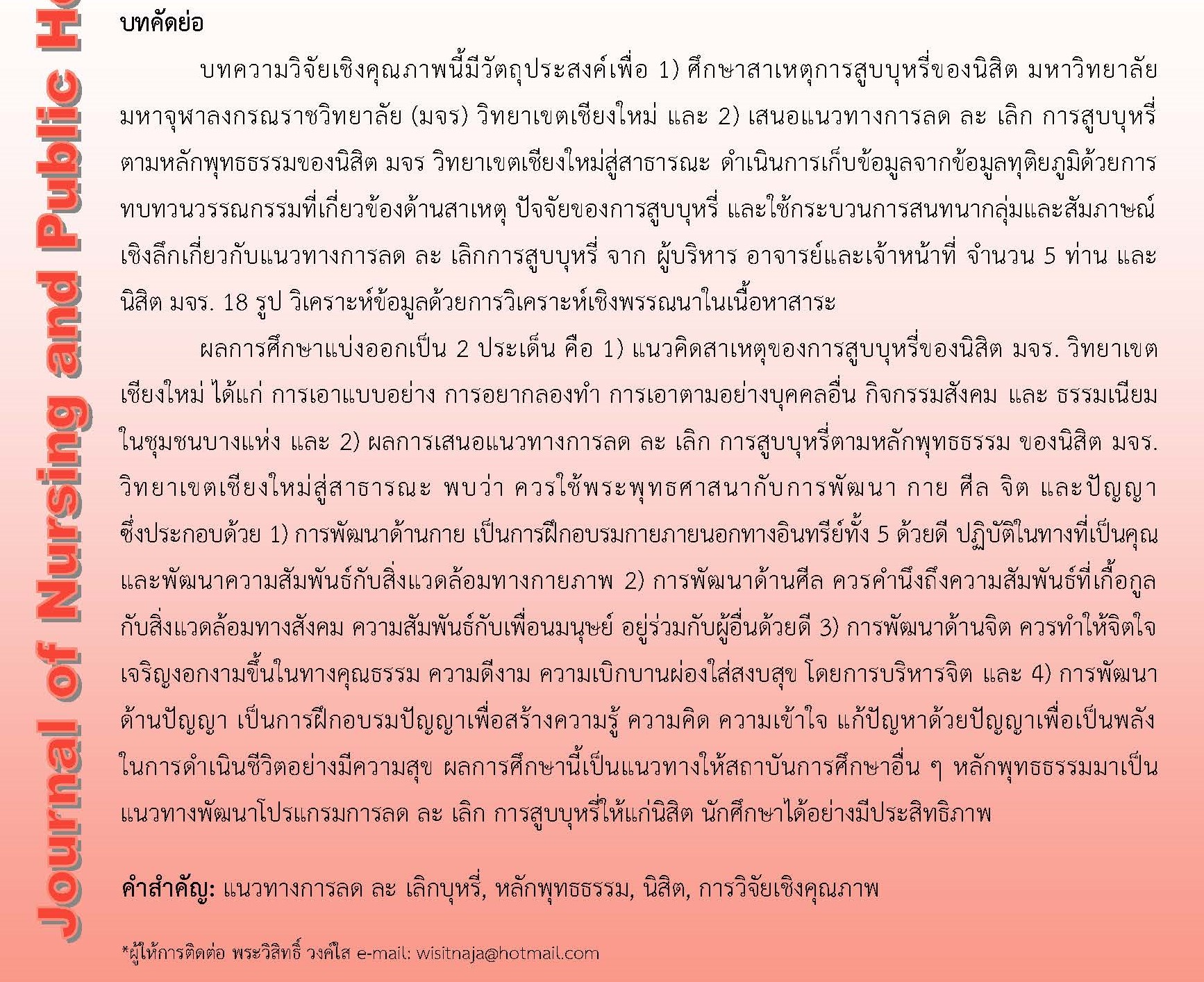Guidelines for Reducing and Quitting Smoking According to Buddhist Principles: Mahachulalongkornrajavidyalaya University Chiang Mai Campus
Keywords:
Guidelines for Reducing and Quitting Smoking, Buddhist Principles, Students, Qualitative ResearchAbstract
The objectives of this qualitative research article were to: 1) study the causes of smoking among students at Mahachulalongkornrajavidyalaya University (MCU), Chiang Mai Campus, and 2) propose guidelines for reducing and quitting smoking based on Buddhist principles for MCU students at the Chiang Mai Campus to the public. Data collection was carried out using secondary data through a literature review related to the causes and factors of smoking. Additionally, the process included focus group discussions and in-depth interviews about the guidelines for reducing and quitting smoking with five administrators, teachers, and staff, as well as 18 MCU students. The data was analyzed using descriptive content analysis.
The study results were divided into two issues: 1) the concepts of the causes of smoking among MCU Chiang Mai Campus students, which included imitation, the desire to try, peer influence, social activities, and cultural traditions in some communities; and 2) the proposed guidelines for reducing and quitting smoking according to Buddhist principles for MCU Chiang Mai Campus students and the public. The findings indicated that Buddhism could be utilized for the development of the body, precepts, mind, and wisdom. This included: 1) physical development through proper training of the five senses, virtuous actions, and fostering a harmonious relationship with the physical environment; 2) moral development by fostering beneficial relationships within the social environment and promoting cooperation with others; 3) mental development aimed at cultivating virtuous qualities such as tranquility, peace, and radiance through mindfulness practices; and 4) wisdom development through the cultivation of knowledge, understanding, and problem-solving skills, using wisdom as a guiding principle for a fulfilling life. These study results provide a guideline for other educational institutions to apply Buddhist principles in developing effective programs for students to reduce and quit smoking.
References
ณัฎฐกานต์ จุลจันทนโพธิ์ และคณะ. (2563). การพัฒนารูปแบบ ลด ละ เลิก บุหรี่ ในชุมชน กรณีศึกษา หมู่ 7 บ้านแก่นเท่า ตำบลบ้านฝาง อำเภอบ้านฝาง จังหวัดขอนแก่น. สืบค้นเมื่อ 5 มิถุนายน 2566 จาก http://gishealth.moph.go.th/healthmap/work.php?maincode=15011.
พระครูวิรุฬสุวรรณดิตห์ กนฺตธมฺโม. (2564). พระพุทธศาสนากับการพัฒนาสุขภาพแบบองค์รวม. รายงานสืบเนื่องจากการประชุมวิชาการระดับชาติครั้งที่ ๗ วิทยาลัยสงฆ์ลำพูน: มหาวิทยาลัยมหาจุฬาลงกรณ ราชวิทยาลัย.
พระครูสิริปัญญานุโยค (ปัญญา ภู่มาลา). (2561). รูปแบบการส่งเสริมสุขภาวะทางสังคมของพระสังฆาธิการในสังคมไทย. ปริญญาพุทธศาสตรดุษฎีบัณฑิต. บัณฑิตวิทยาลัย: มหาวิทยาลัยมหาจุฬาลงกรณราชวิทยาลัย.
พระไตรปิฎกฉบับมหาจุฬาฯ. (2566). พระไตรปิฎกเล่มที่ 21 พระสุตตันตปิฎกเล่มที่ 13 [ฉบับมหาจุฬาฯ] อังคุตตรนิกาย จตุกกนิบาต. สืบค้นเมื่อ 15 กรกฎาคม 2566 จากhttps://84000.org/tipitaka/read/m_siri.php?B=21&siri=41.
พระธรรมปิฎก (ประยุทธ์ ปยุตโต). (2539). การศึกษาเพื่ออารยธรรมที่ยั่งยืน. พิมพ์ครั้งที่ 3. กรุงเทพฯ: มูลนิธิพุทธธรรม.
พระพรหมคุณาภรณ์ (ป.อ. ปยุตฺโต). (2564). พุทธธรรม (ฉบับเดิม). พิมพ์ครั้ง 10. กรุงเทพฯ: บริษัท เอส. อาร์ พริ้นเตอร์ แมส โปรดักส์ จำกัด.
พระมหาสุเทพ สุปณฺฑิโต (ผิวเผือด). (2560). แนวทางการจัดการปัญหาบุหรี่ในมหาวิทยาลัยมหาจุฬาลงกรณราชวิทยาลัย. วารสารสังคมศาสตร์ มหาวิทยาลัยศรีนครินทรวิโรฒ, 20(20), 102.
พระสุทิน จกฺกวโร (ราชวัฒน์). (2562). การประยุกต์ใช้หลักพุทธธรรมเพื่อส่งเสริมสุขภาวะของชุมชนบ้านหนองบัวอำเภออาจสามารถ จังหวัดร้อยเอ็ด. ปริญญาพุทธศาสตรมหาบัณฑิต สาขาวิชาพระพุทธศาสนา.บัณฑิตวิทยาลัย: มหาวิทยาลัยมหาจุฬาลงกรณราชวิทยาลัย.
รัชตะ รอสูงเนิน และคณะ. (2564). แนวทางการปรับเปลี่ยนพฤติกรรมในการเลิกบุหรี่. วารสารวิทยาลัยนครราชสีมา, 15(2), 365-366.
ษมาพร รักจรรยาบรรณ. (2559). สรรสาระองค์กรสุขภาวะ แนวคิดและกรณีตัวอย่าง: องค์กรสุขภาพดี (Happy Body). กรุงเทพฯ: บริษัท พี.เอ. ลีฟวิ่ง.
Cortés-Rodríguez, M., Galindo-Villardón, P., Sánchez-Barba, M., Jarauta-Bragulat, E., & Urchaga-Litago, J. D. (2023). Analysis of psychological well-being from a compositional data analysis perspective: A new approach. Behavioral Sciences (Basel, Switzerland), 13(11), 926. https://doi.org/10.3390/bs13110926
Le Foll, B. et al., (2022). Tobacco and nicotine use. Nature Reviews. Disease Primers, 8(1), 19. https://doi.org/10.1038/s41572-022-00346-w
Ryff, C. D. (2014). Psychological well-being revisited: Advances in the science and practice of eudaimonia. Psychotherapy and Psychosomatics, 83(1), 10-28. https://doi.org/10.1159/000353263
Thrash, T. M., & Elliot, A. J. (2003). Inspiration as a psychological construct. Journal of Personality and Social Psychology, 84(4), 871-889. https://doi.org/10.1037/0022-3514.84.4.871

Downloads
Published
How to Cite
Issue
Section
License
Copyright (c) 2024 Journal of Nursing and Public Health Research

This work is licensed under a Creative Commons Attribution-NonCommercial-NoDerivatives 4.0 International License.
1. บทความหรือข้อคิดเห็นใด ๆ ที่ปรากฏในวารสารวิจัยการพยาบาลและการสาธารณสุข ที่เป็นวรรณกรรมของผู้เขียน บรรณาธิการไม่จำเป็นต้องเห็นด้วย
2. บทความที่ได้รับการตีพิมพ์ถือเป็นลิขสิทธิ์ของ วารสารวิจัยการพยาบาลและการสาธารณสุข








